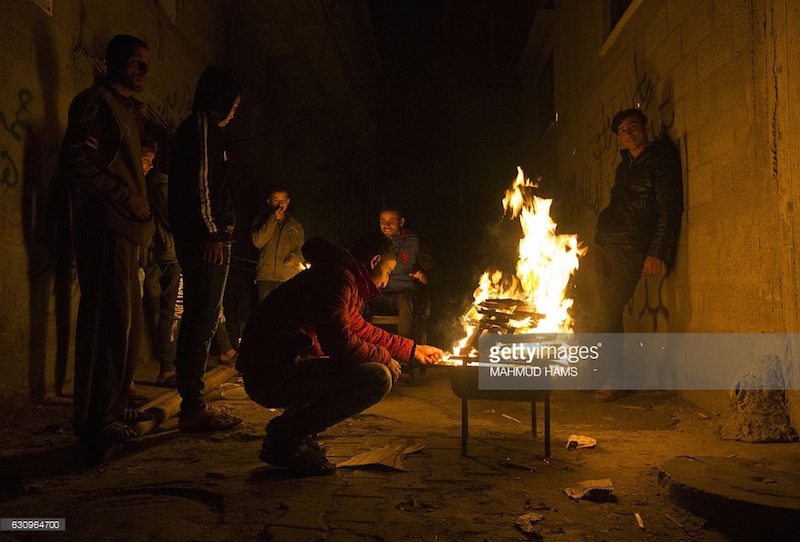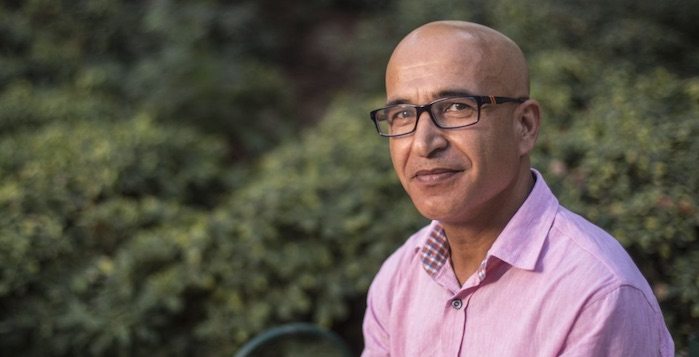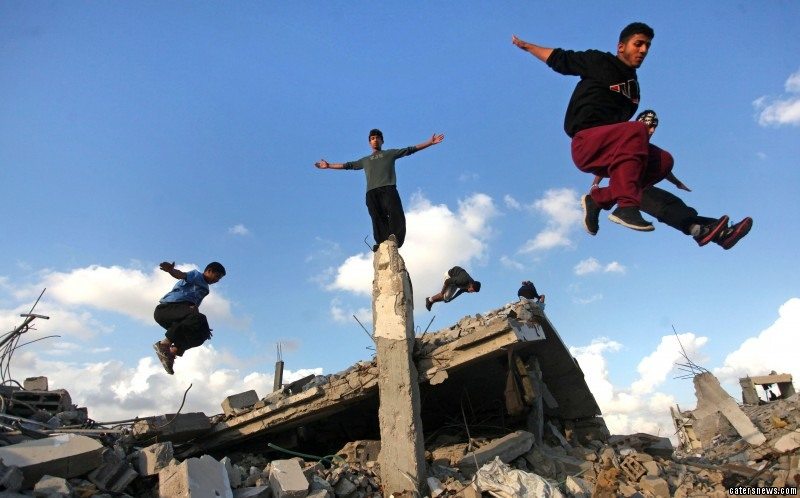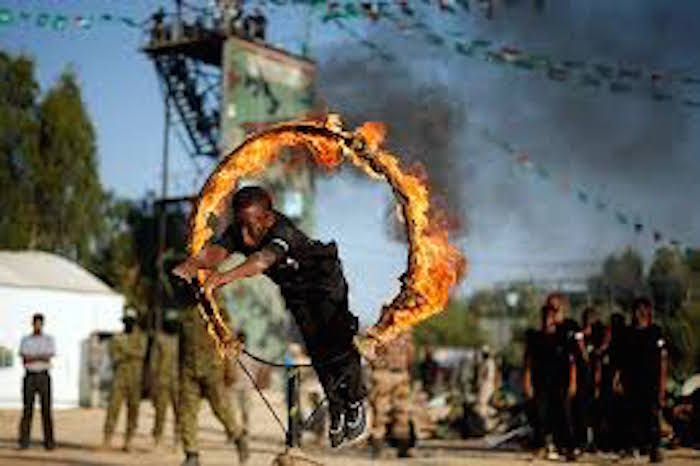Mohammed Mansour, who treats Gaza victims of sexual assault, describes the dystopian nightmare that Palestinians are living
By Ayelett Shani
For more than a decade you’ve been making frequent visits to the Gaza Strip, as a volunteer who provides psychological assistance.
I’m an expert in trauma treatment, and more specifically of children who have undergone sexual assault or who display abusive sexual behavior. As part of the humanitarian assistance given, I treat children and train professionals to provide trauma therapy. I go in and out of Gaza, under the auspices of the Physicians for Human Rights nonprofit, every two to three months. In the 1990s I even lived there for half a year while I was doing a research study.
So you’re well acquainted with pre-embargo Gaza, too.
Of course.
And I understand that it’s your feeling, from your last visit, about a month ago, that something has changed. You discern a new tendency.
Yes. In this visit I encountered a large number of cases of sexual abuse among the children. That’s a phenomenon that has always existed, but in this visit, and also in the previous visit, in August, it suddenly reached far larger dimensions. It’s become positively huge. More than one-third of the children I saw in the Jabalya [refugee]camp reported being sexually abused. Children from ages 5 to 13.
What do you mean by “sexual abuse”?
Everything from being touched to rape.
Who are the perpetrators?
Adults and other children of the same age or older, or someone in the family. Parents, brothers, uncles. In one case I saw, the mother of a mentally disabled 12-year-old girl told me that the girl was behaving very irritably. Every time I put my hand close to her face she flinched sharply, she looked really frightened. I asked the mother if she’d always been like this, and she said yes. I asked her to leave the room and I spoke to the girl. She told me that her father was abusing her. She didn’t say “abusing,” of course; she said he sleeps with her. It was utterly shocking, even for me, and I am used to such stories. My whole body trembled when she talked about it.
What did you say to her?
That a father is forbidden to touch his daughter. I tried to teach her how to defend herself. I know it won’t necessarily help.
And you can’t tell the mother.
No. That would only put the girl at even greater risk, if people know that she told. In general, when children are abused within the family, the mother knows and is silent. I believe that this mother also knew. By the way, that is the most severe trauma for the child: not the abuse, but the mother’s betrayal.
A conspiracy of silence. It’s even more complex in such a conservative society, where everything related to sex is taboo.
Conservatism is also found among mental health professionals. They don’t talk about sexuality, about sexual abuse. If one of my colleagues encounters children who have been sexually abused, he is silent.
Appalling.
That silence, by members of the profession, is the second betrayal.
And the bottom line is that children who have suffered sexual abuse have nowhere to turn to, no one to talk to.

No one.
Do you know the rate of sexual abuse of children in Gaza?
No. There is no systematic research. But children who live in conditions of neglect are more vulnerable to sexual abuse. Poverty and trauma go hand in hand.
I once met a therapist who works with women in prostitution. She told me that the assailants know whom to choose. They know which girl has no one waiting for her at home.
That’s right. The assailants are adept at identifying whom they can abuse, and from this point of view the children of Gaza are indeed vulnerable. Almost every family has 14 or 15 children, and they live in terrible poverty. Most people don’t work, and those who do, earn pennies – the average salary is 1,000 shekels a month [$285]. Mentally and physically, parents are simply not capable of supporting their children. They are immersed in their own depression, their own trauma. And most of the Gaza’s residents are suffering from depression and trauma, they can’t provide their children with even the most basic needs.
There’s starvation.
Definitely. I’ve seen the starvation. I visit meager, empty homes. The refrigerator is off even during the hours when they have electric power, because there’s nothing in it. The children tell me that they eat once a day; some eat once every two days. A neurologist who works with us, Rafik Masalha, did a study on nutrition. A child in the Gaza Strip eats meat an average of once a month and chicken maybe once a week, and we’re talking about one chicken for a family of 15 children.
Palestinian law stipulates the death penalty for assaulting minors. There have been precedents: People have been executed.
The death penalty stipulated in the law applies to abuse outside the family. In cases of intra-family abuse, it’s up to the victim to prove it. No child will dare to talk about abuse like that. A child of 6 whose mother abuses him sexually, or a girl who is abused by her father and her brothers, will not inform on them – especially as many children who are sexually abused don’t know that they are undergoing abuse. They don’t know that this is what’s happening to them. They don’t know and they don’t even invest energy in an attempt to understand what it is.
What about attacks by children against other children?
For children who endure sexual abuse, there is an element in the abuse that is pleasurable. Children who endure protracted sexual abuse, without anyone working with them on their trauma, deny and repress the pain involved, and focus on the pleasurable part. A child like that is prone to even greater harm, and prone to harm other children.
The victim becomes the assailant.
A child who is abused sexually is under the total domination of the abuser, whose main occupation is how to dominate. Abusing other children is the ultimate way to restore control to himself.
Who tells you about these assaults? The victims or the assailants?
The assailants. They don’t call it assault at all. They tell me what they do to other children. The first thing I do is explain to them that they [themselves]have undergone abuse, and that what they are doing to other children is abuse.
We are talking about abuse by male adolescents against other male adolescents, or by boys against boys?
Yes.
Are they homosexuals?
No.
Palestinian youths practice their Parkour skills over the ruins of houses, which witnesses said were destroyed during a seven-week Israeli offensive, in Khan Younis city in Gaza Strip, 2014. MAJDI FATHI / NurPhoto
Then, why?
Because it’s easier socially. If a boy assaults a girl, and she tells someone, he will be killed. They will settle accounts with him within the neighborhood.
Everything you’ve told me so far is appalling in itself, but the thought that they perhaps find consolation in assaulting others is simply unendurable.
Yes. Some of them find consolation, pleasure, release in it. They don’t experience it as an assault, and it’s very difficult to treat them and reach the root of their trauma – both because they have endured multiple traumas, and also because the trauma is ongoing. The first step in treating people who have been wounded by violence and neglect is to remove them from the situation of violence and neglect. In Gaza that’s impossible. The trauma does not end and will not end. Adults and children live in terrible pain, they’re only looking for how to escape it. We also see growing numbers of addicts.
What are they addicted to?
The most widespread addiction today among men and male youths in Gaza is tramadol. It’s actually a prescription drug for muscle pain.
It’s an opiate?
Yes. One of the side effects of tramadol – it’s considered a supposedly positive effect – is that it extends the duration of an erection and heightens sexual desire both in men and in women. The tramadol that gets to Gaza is manufactured in China, and passes through Egypt. In in Egypt it undergoes some sort of manipulation. I don’t know exactly what they do there, what they add, but the tramadol in the Gaza Strip is not the same tramadol that people take in Israel. There’s something else. It’s extremely addictive and it affects behavior.
They probably add an amphetamine.
Yes, one of the amphetamines. Something with an effect that resembles that of cocaine. One reason I know this is because I took tramadol for a few months and didn’t experience those side effects. And when I stopped taking it I didn’t feel a need to take it again.
But you claim that the Gaza version is addictive.
Very. They can’t get along without it. And it’s very popular. In 2014, a package of tramadol cost 20 shekels [about $5]. Today it’s 20 shekels for one tablet.
The hospitals in Gaza don’t have basic medicines. How is tramadol available? And how can people pay for it?
It’s not considered a medicine, but a drug. There are dealers in Gaza, and if they’re caught they go to jail. A lot of hashish entered Gaza from Egypt until the tunnels were shut down; today, with no tunnels, there’s no hash. People are looking for something else. I don’t know how it enters and how they manage to get the money, but the numbers speak for themselves: According to a study conducted there, 41 percent of the addicts in Gaza are hooked on tramadol.
And that, correspondingly, increases the proportion of sexual assaults.
Certainly. Unmarried youths who can’t find any other release for heightened desire, assault children and other youths. The married men are constantly looking for sex and sexual ties, they talk about it all the time. In front of their children, too. They talk about how many times they have sex, with how many women, about their relations with women.
Extramarital relations? Cheating? In Gaza?
Yes, sure, all the time.
You are describing a society that’s conservative on the surface, and in total chaos below.
“Chaos” – that’s the word.
A young Palestinian jumps through a ring of fire during a military graduation ceremony at a Hamas summer camp in Khan Younis in the southern Gaza Strip, August 18, 2017. MOHAMMED SALEM/REUTERS
A life of despair
All the social conventions have broken down. Anomie.
There are no social conventions, and on top of that there is tremendous despair. Everyone I meet there is in despair. I get into a taxi and the driver talks to me about his feeling of despair, about how he’s using tramadol. I enter a restaurant where I always dine, the waiters sit with me at the table and tell me about their despair. I visit a psychiatric hospital, and the psychiatrists and psychologists immediately come and want to talk to me about their personal problems, before we begin talking about professional matters. Everyone is in despair. They don’t enjoy anything.
No wonder sex becomes an obsession. It’s perhaps the only enjoyment that’s available. The only vitality they can feel.
I think they engage in sex not for enjoyment but for release. That for them, sexuality is connected to hope. With all the death and the symbols of death they’re surrounded with, this is life. It’s impossible to really understand what’s happening in Gaza, impossible to understand what’s really happening within people’s psyche. Even I, who deal with mental health, can’t really understand what they think and feel.
It’s like the plot of a dystopian book or film, or like a frightening social experiment. A totally isolated society living in horrific conditions, without electric power, between ruins, under a dictatorial government. What holds that society together?
Nothing. They’re in the throes of an internal struggle. At one time, what united them was the feeling that they were all in the same boat: Everyone suffers from the blockade, from the Israeli attacks. There was a sense of shared destiny. That no longer exists. They blame one another for the situation, quarrel, fume; it really is chaos. The only thing that can perhaps be said to be an organizing factor is the regime.
So the despotic regime in Gaza is the last barrier to total collapse? That’s the block?
Unfortunately, yes. If it didn’t exist, there would be crime, and only crime, all the time.
What kind of person does a society like this produce?
One who is unhealthy, mentally.
Everyone?
Everyone there is mentally unhealthy. When people are mentally unhealthy, the result can be serious psychic disorders. People with disorders who aren’t treated – and they are not treated – are capable of everything.
It’s a society in which everything is permitted?
Everything is permitted and everything is forbidden. I can do whatever I want, as long as people don’t know what I’m doing.
It’s like criminal thinking: Everything is allowed, and the only important thing is not to get caught.
Yes. You know, having affairs is forbidden. It’s totally forbidden, by law, for a man and a woman to be seen together in the evening if they’re not married. They could end up in jail, even be killed for that. But they feel that they’re allowed to conduct sexual relations as long as others don’t know. It simply must not be known. That’s what most important in the Gaza Strip today.
So relationships are between partners in crime.
Yes.
Are there no friendships? Are all relationships governed by vested interests?
It’s everyone for himself. I see it even among my colleagues. There used to be solidarity in Gaza, it was a very cohesive society, with good, strong interpersonal ties. These days people are indifferent even to their best friends. They feel that they have to look out for themselves and only themselves. When a person has nothing to eat, he can’t connect with someone who can’t help him, even if the other is in the same situation. It’s different, for example, from the Syrian refugees I work with in Greece. The refugees are only looking for what they have in common, they want to be together. Ten years ago, that’s how it was in Gaza, too. Today that has disappeared. Even within the family there’s no mutual help. We are seeing a tremendous, accelerated breakdown of society in Gaza. It could even end in civil war. There are feuds between hamulot [clans]in Gaza, and those rifts will only become more severe.
What’s the philosophical conclusion? That in conditions like these internal morality disappears, one loses one’s humanity?
People lose their humanity. Of course. There’s an Italian psychoanalyst, a friend of mine, Franco Dimasio, who maintains that life amid a struggle for survival causes us to lose our humanity.
What does he include under the term “humanity”?
The ability to see the other, his pain. It will be very difficult to restore the Gazans’ humanity, because they are occupied with their survival, they are concentrated on themselves. They don’t see the other. They themselves have lost control over their sense of feeling, their whole behavior has become a form of acting out.
In other words, they express their feelings and their threatening and repressed impulses through their behavior. That means aggressive behavior, for the most part.
The aggression is very much present. People are constantly cursing one another. On the street, on the roads. In Shujaiyeh [a Gaza City neighborhood]I saw a huge quarrel between hamulot, because someone put a bag of garbage next to the neighbor’s door – the whole neighborhood was inflamed. I see it also in my work with the psychologists and psychiatrists in the training courses I give. I’m stunned at how they behave toward one another. Let’s say, if someone interrupts someone, or is late, they immediately erupt into vulgar language. With the children it takes the form of fights. All the children in Gaza have wounds from the blows they give and receive.
One boy in Jabalya explained to me that he’s violent because he’s being hit all the time – by his brothers, by his friends, by the neighbors. “When they see me being weak, they hit me,” he said. “If they would see me being strong they wouldn’t hit me.” If I harm others, I am strong. That’s the ongoing acting out. In the market in Gaza a quarrel breaks out every 10 minutes, shouts and blows, the police arrive within seconds and start hitting everyone. Which, of course, is more of the same: They’re acting out, too.
Hell.
Gaza is hell. I think of Gaza’s beautiful beaches in the 1990s. Today, when you begin to approach them, you smell the sewage and see the heaps of garbage. In the most recent visit, I went for a walk on the beach one evening and saw two children sitting next to a campfire, smack in the middle of the piles of garbage. When I started talking to them, one of them grew scared and wanted to run away. I gave them 50 shekels [$14]. They stood there and looked at the bill. Flabbergasted. They couldn’t believe they had 50 shekels in their hands. Suddenly they both started to run. A few minutes later, I saw them from afar, surrounded by dozens of other children, showing them the bill, and the other children also flabbergasted. Did they ask them where the people who hand out money were? I cried when I saw it. I cry a lot in Gaza.
That’s understandable. How do you cope with the horrors you see? How do you go back to the routine in Israel after that?
I cope with a great deal of pain. Or, more accurately, I try to cope with a great deal of pain. My thoughts are constantly both here and there. I have two children. When I spend time with them, I get flashbacks of Gaza children of the same age. Images. Voices. Contacts. And the bodies I saw, too. I’ve seen many bodies of children in wars. Those sights come back to me whenever something triggers a remembrance of someone or something in Gaza.
So you’re in post-trauma, too.
Everyone who works with people like that is burdened with post-trauma. I invest a great deal of emotional effort in coping with it, in processing what I undergo. I work a lot on my land – I grow olives, I’m occupied with bees.
Do you still believe in human goodness?
I believe that even people who undergo severe traumas possess the inner strength to go on living, and to live a better life than the one they had. If I lose that hope, I would not be able to go on working. If I didn’t harbor the hope that the refugees in Greece can be rehabilitated, I wouldn’t work with them. If I didn’t harbor the hope that the situation in Gaza will get better, and that people have the strength to change it, I wouldn’t be able to go on. Every time I enter Gaza and experience that pain, I say to myself: I’m not going back again, and afterward, when I’m at the exit, at Erez checkpoint, I’m already planning when I’ll go back.
Mohammed Mansour, a psychologist who volunteers in Gaza with Physicians for Human Rights. Tomer Appelbaum




[…] Gaza Kids Live in Hell: A Psychologist Tells of Rampant Sexual Abuse, Drugs and Despair […]